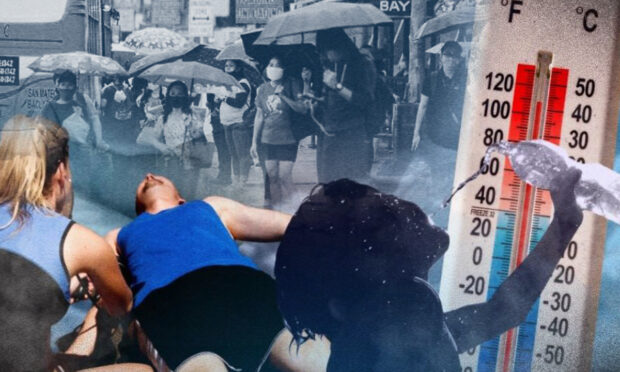DOH gives first-aid steps to prevent heat-related ailments

WEATHER COMPOSITE IMAGE: INQUIRER STOCK/FILE PHOTOS
MANILA, Philippines — The Department of Health (DOH) on Tuesday listed first-aid measures against heat-related illnesses following reports of high heat index across the country.
Heat index temperatures as high as 45 degrees Celsius have been logged in some provinces from March 28 to April 1.
These conditions are forecast to persist in the coming days, the DOH said, citing predictions from the Philippine Atmospheric Geophysical and Astronomical Services Administration (Pagasa).
READ: DOH chief reminds public: Hydrate, ‘cool off’ vs summer diseases
Pagasa explained heat index temperatures ranging from 33 to 41 degrees Celsius are classified under “extreme caution,” while 42 to 51 degrees Celsius are labeled under the “danger” level.
Article continues after this advertisementOn April 2, eleven areas across the country were expected to reach heat index temperatures within the “danger” level.
Article continues after this advertisement“Such temperatures can lead to heat cramps and heat exhaustion, characterized by symptoms such as fatigue, dizziness, headache, vomiting and light-headedness,” the health department said in a statement.
“Prolonged heat exposure increases the probability of heat stroke, a serious condition characterized by loss of consciousness, confusion or seizures, which can be deadly if left untreated,” it added.
According to the DOH, if any of the five symptoms are observed, the following first aid measures must be applied:
- Move the person to a shaded, cool area and provide ventilation.
- Remove the person’s outer clothing.
- Apply cold compresses, ice packs, cold water or cold wet cloth against the skin, especially the head, face, neck, armpits, wrists, ankles and groin.
- If the patient is conscious, encourage frequent slow sips of cool water.
- Contact emergency services or bring the person to the hospital immediately.
Preventive measures against heat-related illnesses have also been recommended by the DOH, including drinking plenty of water; avoidance of iced tea, soda, coffee or alcoholic drinks; limiting time spent outdoors between 10 am to 4 pm; and usage of protection against sunburn such as hats, umbrellas and sunblock; and wearing of loose fitting and lightweight clothing.
The health department likewise advised the public to regularly monitor heat index reports from Pagasa.
READ: Searing 44°C heat index forecast for Capiz’s Roxas City on April 2
The state weather bureau defines heat index as a “human discomfort index that gives the apparent temperature on what humans perceive or feel as the temperature (from the surroundings) affecting the body.”
Health secretary Teodoro Herbosa, in the same statement, said the DOH is “actively monitoring cases of heat-related illnesses.”